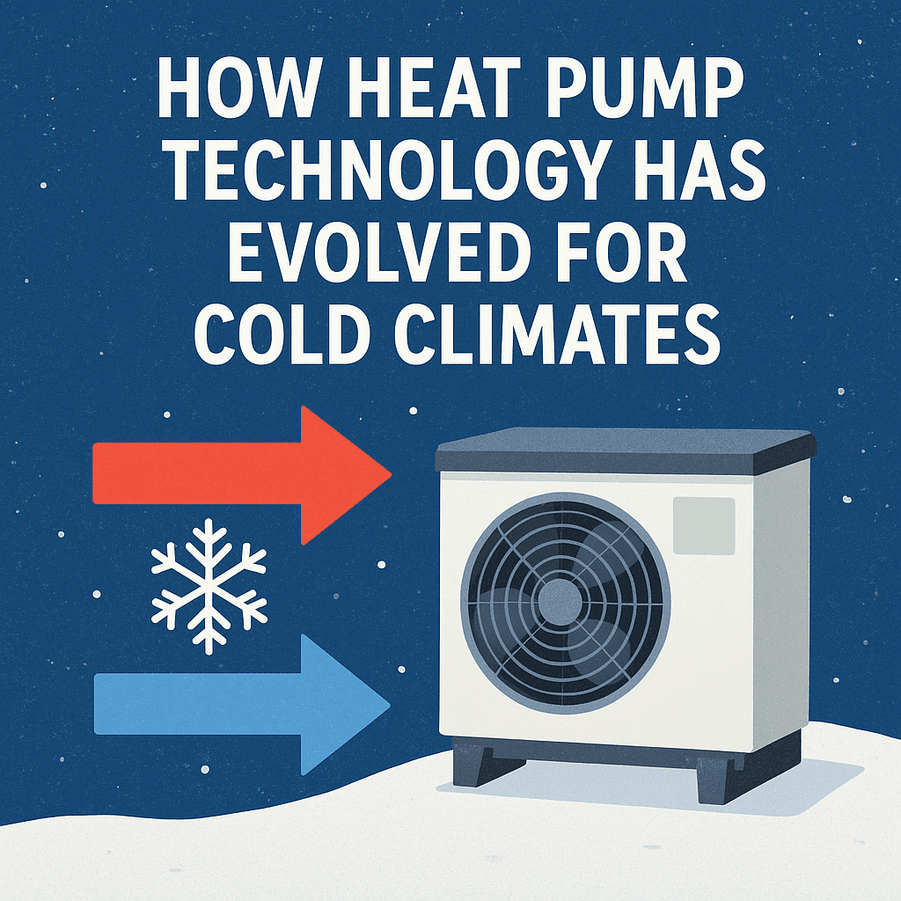The Rise of Heat Pumps in Cold Climate Applications
In recent years, heat pump technology has undergone significant innovations, especially for regions that experience harsh winters and sub-zero temperatures. Traditionally seen as suitable only for moderate climates, today’s cold-climate heat pumps (CCHPs) are revolutionizing home heating for eco-conscious users. These systems now offer year-round efficiency, advanced performance, and reduced carbon footprints, making them a superior choice in both residential and commercial applications.
Understanding Cold-Climate Heat Pump Technology
What Sets Cold-Climate Heat Pumps Apart
Unlike conventional heat pumps that struggle below freezing, cold-climate heat pumps use cutting-edge inverter-driven compressors and enhanced refrigerant cycles that allow them to extract heat from the air even at -15°F (-26°C) or lower. These systems utilize:
- Variable-speed compressors that adjust heating output based on demand
- Enhanced vapor injection (EVI) technology for better low-temperature performance
- Advanced defrost cycles to maintain operation without excessive energy use
The result is a reliable, energy-efficient alternative to fossil fuel systems, even in regions known for long, cold winters.
Eco-Friendly and Energy Efficient
Why Cold-Climate Heat Pumps are the Green Choice
Cold-climate heat pumps align with the goals of homeowners looking to reduce carbon emissions and energy consumption. By relying on renewable energy sources like solar or wind for electricity, the environmental impact is further minimized.
Key environmental benefits include:
- Up to 300% energy efficiency, meaning they produce 3 units of heat for every unit of electricity consumed
- Zero on-site emissions, unlike oil or gas furnaces
- Compatibility with net-zero home goals and government decarbonization targets
Moreover, many governments offer rebates and incentives for switching to high-efficiency heat pumps, making them not just environmentally sound but economically appealing as well.
Performance in Sub-Zero Temperatures
Heating Capacity Without Compromise
Modern CCHPs have proven their ability to provide consistent indoor comfort, even during the coldest months. Performance metrics show:
- Maintains 90% heating capacity at 5°F (-15°C)
- Delivers stable operation down to -22°F (-30°C) for premium models
- Advanced dual-fuel systems can automatically switch to backup heat when needed, optimizing both cost and comfort
These breakthroughs are made possible by improvements in coil design, thermal expansion valves, and refrigerant flow optimization.
Technological Innovations Driving the Change
Smart Sensors and Zoning Control
Integration of smart thermostats and zone-based systems has elevated the functionality of cold-climate heat pumps. Homeowners now enjoy:
- Room-by-room temperature control for maximum efficiency
- Remote access through mobile apps
- Predictive analytics for proactive maintenance and optimized performance
Furthermore, dual-stage and modulating units ensure a quiet, smooth operation by ramping up and down instead of cycling on and off, improving system longevity and reducing energy spikes.
Installation and Retrofitting: Easier Than Ever
Flexible Design for All Types of Homes
Today’s heat pumps are designed for flexible installation, whether it’s a new build, an older home, or a commercial building. Options include:
- Ducted systems that replace or integrate with existing forced-air systems
- Ductless mini-splits perfect for additions, renovations, or homes without ductwork
- Hybrid systems that pair with gas furnaces for additional assurance in extremely cold climates
With compact outdoor units and sleek indoor heads, modern heat pumps blend functionality with aesthetics. Most importantly, many systems qualify for Energy Star certifications, ensuring they meet or exceed high-efficiency benchmarks.
Cost Savings Over Time
Lower Utility Bills, Higher ROI
While initial installation costs of heat pumps can be higher than traditional systems, the long-term savings quickly offset this investment:
- 30–50% reduction in annual heating costs
- Lower maintenance expenses compared to gas or oil furnaces
- Lifespan of up to 20 years with proper care
When combined with solar panels or time-of-use energy rates, these savings can be amplified. As fuel prices rise, electricity-based heating systems offer greater price stability and predictable utility bills.
Government Incentives and Rebates
Making the Switch More Affordable
To accelerate the adoption of clean energy, many regional and national governments provide:
- Tax credits up to 30% for high-efficiency heat pump installations
- Utility rebates for replacing outdated systems
- Zero-interest loans for energy-efficient upgrades
In the U.S., programs like the Inflation Reduction Act and ENERGY STAR® support homeowners in transitioning to cold-climate technologies. Similar initiatives exist across Canada and parts of Europe, making it easier for consumers to invest in eco-forward solutions.
Choosing the Right Cold-Climate Heat Pump
Key Considerations Before Purchase
When selecting a cold-climate heat pump, it’s important to evaluate:
- Capacity and BTU rating for your region’s climate zone
- Energy Efficiency Ratio (EER) and Heating Seasonal Performance Factor (HSPF)
- Warranty coverage and support from reputable brands like Mitsubishi, Fujitsu, Daikin, and Carrier
Work with certified HVAC professionals who can perform load calculations, assess insulation levels, and provide tailored installation solutions.
The Future of Heat Pump Technology
Next-Gen Features on the Horizon
The next evolution in heat pump tech includes:
- CO₂ refrigerant-based systems, offering ultra-low GWP (Global Warming Potential)
- AI-enhanced diagnostics for real-time troubleshooting and self-optimization
- Grid-interactive capabilities for smarter energy use and potential utility buy-back
As demand rises for clean, all-electric heating systems, manufacturers are racing to improve performance, durability, and integration with smart home platforms.
Conclusion: Embrace the Cold with Confidence
Cold-climate heat pump technology has matured into a reliable, efficient, and sustainable solution for heating needs in frigid regions. Whether you’re a homeowner seeking comfort, a builder aiming for energy compliance, or an eco-conscious consumer, modern heat pumps offer the power to heat responsibly—even when the mercury plummets.

